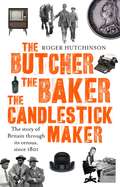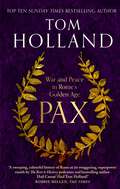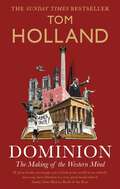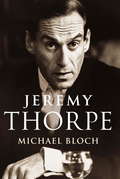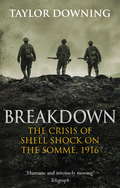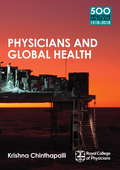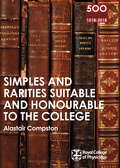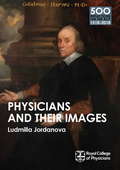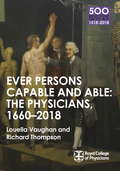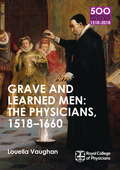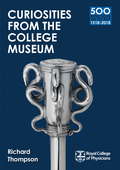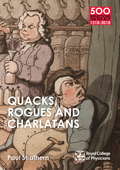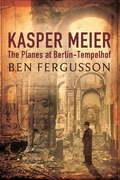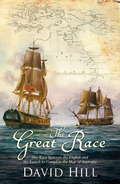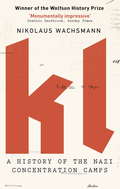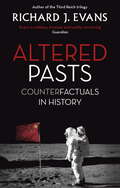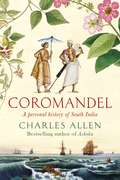- Table View
- List View
The Butcher, the Baker, the Candlestick-Maker: The story of Britain through its census, since 1801
by Roger HutchinsonAt the beginning of each decade for 200 years the national census has presented a self-portrait of the British Isles.The census has surveyed Britain from the Napoleonic wars to the age of the internet, through the agricultural and industrial revolutions, possession of the biggest empire on earth and the devastation of the 20th century's two world wars.In The Butcher, the Baker, the Candlestick Maker, Roger Hutchinson looks at every census between the first in 1801 and the latest in 2011. He uses this much-loved resource of family historians to paint a vivid picture of a society experiencing unprecedented changes.Hutchinson explores the controversial creation of the British census. He follows its development from a head-count of the population conducted by clerks with quill pens, to a computerised survey which is designed to discover 'the address, place of birth, religion, marital status, ability to speak English and self-perceived national identity of every twenty-seven-year-old Welsh-speaking Sikh metalworker living in Swansea'.All human life is here, from prime ministers to peasants and paupers, from Irish rebels to English patriots, from the last native speakers of Cornish to the first professional footballers, from communities of prostitutes to individuals called 'abecedarians' who made a living from teaching the alphabet.The Butcher, the Baker, the Candlestick Maker is as original and unique as those people and their islands on the cutting edge of Europe.
Pax: War and Peace in Rome's Golden Age
by Tom Holland'Holland, who co-hosts the podcast The Rest Is History, is at his best when having fun with Rome's bloody history' The Times 'A book for lovers of traditional, grand sweep narrative history' Sunday TimesThe definitive history of Rome's golden age - antiquity's ultimate superpower at the pinnacle of its greatnessThe Pax Romana has long been revered as a golden age. At its peak, the Roman Empire stretched from Scotland to Arabia, and contained perhaps a quarter of humanity. It was the wealthiest and most formidable state the world had yet seen.Beginning in 69AD, a year that saw four Caesars in succession rule the empire, and ending some seven decades later with the death of Hadrian, Pax presents a dazzling history of Rome at the height of its power. From the gilded capital to realms beyond the frontier, historian Tom Holland portrays the Roman Empire in all its predatory glory. Vivid scene follows vivid scene: the destruction of Jerusalem and Pompeii, the building of the Colosseum and Hadrian's Wall, the conquests of Trajan. Vividly sketching the lives of Romans both ordinary and spectacular, from slaves to emperors, Holland demonstrates how Roman peace was the fruit of unprecedented military violence.A stunning portrait of Rome's glory days, this is the epic history of the pax Romana.Praise for Tom Holland:'Terrific: bold, ambitious and passionate' Peter Frankopan 'An exceptionally good storyteller with a marvellous eye for detail' The Economist'A book that completely transforms your understanding of the world' Spectator'Narrative history at its best' Ian McEwan, Guardian
Dominion: The Making of the Western Mind
by Tom Holland'If great books encourage you to look at the world in an entirely new way, then Dominion is a very great book indeed . . . Written with terrific learning, enthusiasm and good humour, Holland's book is not just supremely provocative, but often very funny' Sunday Times History Book of the YearChristianity is the most enduring and influential legacy of the ancient world, and its emergence the single most transformative development in Western history. Even the increasing number in the West today who have abandoned the faith of their forebears, and dismiss all religion as pointless superstition, remain recognisably its heirs. Seen close-up, the division between a sceptic and a believer may seem unbridgeable. Widen the focus, though, and Christianity's enduring impact upon the West can be seen in the emergence of much that has traditionally been cast as its nemesis: in science, in secularism, and yes, even in atheism. That is why Dominion will place the story of how we came to be what we are, and how we think the way that we do, in the broadest historical context. Ranging in time from the Persian invasion of Greece in 480 BC to the on-going migration crisis in Europe today, and from Nebuchadnezzar to the Beatles, it will explore just what it was that made Christianity so revolutionary and disruptive; how completely it came to saturate the mind-set of Latin Christendom; and why, in a West that has become increasingly doubtful of religion's claims, so many of its instincts remain irredeemably Christian. The aim is twofold: to make the reader appreciate just how novel and uncanny were Christian teachings when they first appeared in the world; and to make ourselves, and all that we take for granted, appear similarly strange in consequence. We stand at the end-point of an extraordinary transformation in the understanding of what it is to be human: one that can only be fully appreciated by tracing the arc of its parabola over millennia.
Jeremy Thorpe
by Michael Bloch'A revealing, insightful and gripping biography of one of the most extraordinary people ever to lead a British political party' ObserverThe story of Jeremy Thorpe's rapid rise and spectacular fall from grace is one of the most remarkable in British politics. When he became leader of the Liberal Party in 1967 at the age of just thirty-seven, he seemed destined for truly great things. But as his star steadily rose so his nemesis drew ever nearer: a time-bomb in the form of Norman Scott, a homosexual wastrel and sometime male model with whom Jeremy had formed an ill-advised relationship in the early 1960s. Scott's incessant boasts about their 'affair' became increasingly embarrassing, and eventually led to a bizarre murder plot to shut him up for good. Jeremy was acquitted of involvement but his career was in ruins.Michael Bloch's magisterial biography is not just a brilliant retelling of this amazing story; ten years in the making, it is also the definitive character study of one of the most fascinating figures in post-war British politics.
Jeremy Thorpe
by Michael Bloch'A revealing, insightful and gripping biography of one of the most extraordinary people ever to lead a British political party' ObserverThe story of Jeremy Thorpe's rapid rise and spectacular fall from grace is one of the most remarkable in British politics. When he became leader of the Liberal Party in 1967 at the age of just thirty-seven, he seemed destined for truly great things. But as his star steadily rose so his nemesis drew ever nearer: a time-bomb in the form of Norman Scott, a homosexual wastrel and sometime male model with whom Jeremy had formed an ill-advised relationship in the early 1960s. Scott's incessant boasts about their 'affair' became increasingly embarrassing, and eventually led to a bizarre murder plot to shut him up for good. Jeremy was acquitted of involvement but his career was in ruins.Michael Bloch's magisterial biography is not just a brilliant retelling of this amazing story; ten years in the making, it is also the definitive character study of one of the most fascinating figures in post-war British politics.
Breakdown: The Crisis of Shell Shock on the Somme
by Taylor DowningParalysis. Stuttering. The 'shakes'. Inability to stand or walk. Temporary blindness or deafness.When strange symptoms like these began appearing in men at Casualty Clearing Stations in 1915, a debate began in army and medical circles as to what it was, what had caused it and what could be done to cure it. But the numbers were never large.Then in July 1916 with the start of the Somme battle the incidence of shell shock rocketed. The high command of the British army began to panic. An increasingly large number of men seemed to have simply lost the will to fight. As entire battalions had to be withdrawn from the front, commanders and military doctors desperately tried to come up with explanations as to what was going wrong. 'Shell shock' - what we would now refer to as battle trauma - was sweeping the Western Front.By the beginning of August 1916, nearly 200,000 British soldiers had been killed or wounded during the first month of fighting along the Somme. Another 300,000 would be lost before the battle was over. But the army always said it could not calculate the exact number of those suffering from shell shock. Re-assessing the official casualty figures, Taylor Downing for the first time comes up with an accurate estimate of the total numbers who were taken out of action by psychological wounds. It is a shocking figure.Taylor Downing's revelatory new book follows units and individuals from signing up to the Pals Battalions of 1914, through to the horrors of their experiences on the Somme which led to the shell shock that, unrelated to weakness or cowardice, left the men unable to continue fighting. He shines a light on the official - and brutal - response to the epidemic, even against those officers and doctors who looked on it sympathetically. It was, they believed, a form of hysteria. It was contagious. And it had to be stopped.Breakdown brings an entirely new perspective to bear on one of the iconic battles of the First World War.
Breakdown: The Crisis of Shell Shock on the Somme
by Taylor DowningParalysis. Stuttering. The 'shakes'. Inability to stand or walk. Temporary blindness or deafness.When strange symptoms like these began appearing in men at Casualty Clearing Stations in 1915, a debate began in army and medical circles as to what it was, what had caused it and what could be done to cure it. But the numbers were never large.Then in July 1916 with the start of the Somme battle the incidence of shell shock rocketed. The high command of the British army began to panic. An increasingly large number of men seemed to have simply lost the will to fight. As entire battalions had to be withdrawn from the front, commanders and military doctors desperately tried to come up with explanations as to what was going wrong. 'Shell shock' - what we would now refer to as battle trauma - was sweeping the Western Front.By the beginning of August 1916, nearly 200,000 British soldiers had been killed or wounded during the first month of fighting along the Somme. Another 300,000 would be lost before the battle was over. But the army always said it could not calculate the exact number of those suffering from shell shock. Re-assessing the official casualty figures, Taylor Downing for the first time comes up with an accurate estimate of the total numbers who were taken out of action by psychological wounds. It is a shocking figure.Taylor Downing's revelatory new book follows units and individuals from signing up to the Pals Battalions of 1914, through to the horrors of their experiences on the Somme which led to the shell shock that, unrelated to weakness or cowardice, left the men unable to continue fighting. He shines a light on the official - and brutal - response to the epidemic, even against those officers and doctors who looked on it sympathetically. It was, they believed, a form of hysteria. It was contagious. And it had to be stopped.Breakdown brings an entirely new perspective to bear on one of the iconic battles of the First World War.
RCP 10: The Global Rcp
by Krishna ChinthapalliThe Royal College of Physicians celebrates its 500th anniversary in 2018, and to observe this landmark is publishing this series of ten books. Each of the books focuses on fifty themed elements that have contributed to making the RCP what it is today, together adding up to 500 reflections on 500 years. Some of the people, ideas, objects and manuscripts featured are directly connected to the College, while others have had an influence that can still be felt in its work.This, the tenth book in the series looks at the impact of the Royal College around the world.
RCP 9: Simples and Rarities Suitable and Honourable to the College (500 Reflections on the RCP, 1518-2018 #9)
by Alastair CompstonThe Royal College of Physicians celebrates its 500th anniversary in 2018, and to observe this landmark is publishing this series of ten books. Each of the books focuses on fifty themed elements that have contributed to making the RCP what it is today, together adding up to 500 reflections on 500 years. Some of the people, ideas, objects and manuscripts featured are directly connected to the College, while others have had an influence that can still be felt in its work.This, the ninth book in the series looks at the libraries and archive of the Royal College.
Simples and Rarities Suitable and Honourable to the College
by Alastair CompstonThe Royal College of Physicians celebrates its 500th anniversary in 2018, and to observe this landmark is publishing this series of ten books. Each of the books focuses on fifty themed elements that have contributed to making the RCP what it is today, together adding up to 500 reflections on 500 years. Some of the people, ideas, objects and manuscripts featured are directly connected to the College, while others have had an influence that can still be felt in its work.This, the ninth book in the series looks at the libraries and archive of the Royal College.
Physicians and their Images
by Ludmilla JordanovaThe Royal College of Physicians celebrates its 500th anniversary in 2018, and to observe this landmark is publishing this series of ten books. Each of the books focuses on fifty themed elements that have contributed to making the RCP what it is today, together adding up to 500 reflections on 500 years. Some of the people, ideas, objects and manuscripts featured are directly connected to the College, while others have had an influence that can still be felt in its work.This, the eighth book in the series looks at the art and portraits of the Royal College.
The Physicians 1660-2018: Ever Persons Capable and Able
by Richard Thompson Louella VaughanThe Royal College of Physicians celebrates its 500th anniversary in 2018, and to observe this landmark is publishing this series of ten books. Each of the books focuses on fifty themed elements that have contributed to making the RCP what it is today, together adding up to 500 reflections on 500 years. Some of the people, ideas, objects and manuscripts featured are directly connected to the College, while others have had an influence that can still be felt in its work.This, the seventh book in the series looks at the history of the Royal College.
The Physicians 1660-2018: Ever Persons Capable and Able (500 Reflections on the RCP, 1518-2018 #7)
by Richard Thompson Louella VaughanThe Royal College of Physicians celebrates its 500th anniversary in 2018, and to observe this landmark is publishing this series of ten books. Each of the books focuses on fifty themed elements that have contributed to making the RCP what it is today, together adding up to 500 reflections on 500 years. Some of the people, ideas, objects and manuscripts featured are directly connected to the College, while others have had an influence that can still be felt in its work.This, the seventh book in the series looks at the history of the Royal College.
Grave and Learned Men: 500 Reflections on the RCP, 1518-2018: 05 Book Six (500 Reflections on the RCP, 1518-2018 #6)
by Louella VaughanThe Royal College of Physicians celebrates its 500th anniversary in 2018, and to observe this landmark is publishing this series of ten books. Each of the books focuses on fifty themed elements that have contributed to making the RCP what it is today, together adding up to 500 reflections on 500 years. Some of the people, ideas, objects and manuscripts featured are directly connected to the College, while others have had an influence that can still be felt in its work.This, the sixth book in the series looks at the history of the Royal College.
Grave and Learned Men: The Physicians, 1518-1660 (500 Reflections On The Rcp, 1518-2018 Ser. #6)
by Louella VaughanThe Royal College of Physicians celebrates its 500th anniversary in 2018, and to observe this landmark is publishing this series of ten books. Each of the books focuses on fifty themed elements that have contributed to making the RCP what it is today, together adding up to 500 reflections on 500 years. Some of the people, ideas, objects and manuscripts featured are directly connected to the College, while others have had an influence that can still be felt in its work.This, the sixth book in the series looks at the history of the Royal College.
Curiosities from the College Museum (500 Reflections on the RCP, 1518-2018 #5)
by Richard ThompsonThe Royal College of Physicians celebrates its 500th anniversary in 2018, and to observe this landmark is publishing this series of ten books. Each of the books focuses on fifty themed elements that have contributed to making the RCP what it is today, together adding up to 500 reflections on 500 years. Some of the people, ideas, objects and manuscripts featured are directly connected to the College, while others have had an influence that can still be felt in its work.This fifth book in the series is a celebration of 50 fascinating objects in the Royal College's museum and collections.
Quacks, Rogues and Charlatans of the RCP (500 Reflections on the RCP, 1518-2018 #3)
by Mr Paul StrathernThe Royal College of Physicians celebrates its 500th anniversary in 2018, and to observe this landmark is publishing this series of ten books. Each of the books focuses on fifty themed elements that have contributed to making the RCP what it is today, together adding up to 500 reflections on 500 years. Some of the people, ideas, objects and manuscripts featured are directly connected to the College, while others have had an influence that can still be felt in its work. This third book in the series is a lively tour of some of the colourful characters and dubious cures that have littered the College's 500-year history, and highlights the role the College has played in regulating the medical profession.
Kasper Meier: The Planes at Berlin-Tempelhof
by Ben Fergusson'He had seen the British soldiers arrive and lead them out through the courtyard: cheats, prostitutes, liars, war criminals, but mostly people like him - half-starved blackmarketeers lying about who they shared their rooms with.' Kasper Meier lives in Berlin - the city and its people broken by war. He scrabbles to get by, finding things that people need: cigarettes, information, other people. A stranger approaches Kasper in a makeshift cafe, seeking the whereabouts of a painting by Gustav Klimt. Kasper is out of his depth, but the promise of goods and the man's menacing threats leave him with no choice but to track it down. The search leads him to Frau Roland and Berlin-Tempelhof, where she spends hours watching the aeroplanes arriving and departing. What is she waiting for? Where is the painting? And is Kasper's life in danger? In this intriguing and compelling short story, Ben Fergusson introduces us to the world of post-war Berlin and provides a taste of his extraordinary debut novel, The Spring of Kasper Meier, which is published in hardback and ebook in July 2014.
Landfalls: A Novel
by Naomi J. WilliamsAn epic voyage, undertaken with the grandest of ambitions.Lapérouse leaves France in the Spring of 1785 with two ships under his command, knowing that he sails with the full backing of the French government. This is to be a voyage of scientific and geographical discovery - but every person on board has their own hopes, ambitions and dreams. As the ships move across vast distances in their journey of nearly four years, the different characters step forward and invite us into their world. From the remote Alaskan bay where a dreadful tragedy unfolds, to the wild journey Barthélemy de Lessups undertakes from the far east of Russia to St Petersburg, the reader is irresistibly drawn into a extraordinarily vivid world. Landfalls is a profoundly moving and intensely evocative novel about scientific exploration, human endeavour and individual tragedy,
The Great Race: The Race Between the English and the French to Complete the Map of Australia
by David HillOn the afternoon of 8 April 1802, in the remote southern ocean, two explorers had a remarkable chance encounter. Englishman Matthew Flinders and Frenchman Nicolas Baudin had been sent by their governments on the same quest: to explore the uncharted coast of the great south land and find out whether the west and east coasts, four thousand kilometres apart, were part of the same island. And so began the race to compile the definitive map of Australia. These men's journeys were the culmination of two hundred years of exploration of the region by the Dutch - most famously Abel Tasman - the Portuguese, the Spanish and by Englishmen such as the colourful pirate William Dampier and, of course, James Cook. The three-year voyages of Baudin and Flinders would see them endure terrible hardships in the spirit of discovery. They suffered scurvy and heat exhaustion, and Flinders was shipwrecked and imprisoned - always knowing he was competing with the French to produce the first map of this mysterious continent. Written from diaries and other first-hand accounts, this is the thrilling story of men whose drawings recorded countless previously unknown species and turned mythical creatures into real ones, and whose skill and determination enabled Terra Australis Incognita to become Australia.
The Great Race: The Race Between the English and the French to Complete the Map of Australia
by David HillOn the afternoon of 8 April 1802, in the remote southern ocean, two explorers had a remarkable chance encounter. Englishman Matthew Flinders and Frenchman Nicolas Baudin had been sent by their governments on the same quest: to explore the uncharted coast of the great south land and find out whether the west and east coasts, four thousand kilometres apart, were part of the same island. And so began the race to compile the definitive map of Australia. These men's journeys were the culmination of two hundred years of exploration of the region by the Dutch - most famously Abel Tasman - the Portuguese, the Spanish and by Englishmen such as the colourful pirate William Dampier and, of course, James Cook. The three-year voyages of Baudin and Flinders would see them endure terrible hardships in the spirit of discovery. They suffered scurvy and heat exhaustion, and Flinders was shipwrecked and imprisoned - always knowing he was competing with the French to produce the first map of this mysterious continent. Written from diaries and other first-hand accounts, this is the thrilling story of men whose drawings recorded countless previously unknown species and turned mythical creatures into real ones, and whose skill and determination enabled Terra Australis Incognita to become Australia.
KL: A History of the Nazi Concentration Camps
by Nikolaus WachsmannIn March of 1933, a disused factory surrounded by barbed wire held 223 prisoners in the town of Dachau. By the end of 1945, the SS concentration camp system had become an overwhelming landscape of terror. Twenty-two large camps and over one thousand satellite camps throughout Germany and Europe were at the heart of the Nazi campaign of repression and intimidation. The importance of the camps in terms of Nazi history and our modern world cannot be questioned. Dr Nikolaus Wachsmann is the first historian to write a complete history of the camps. Combining the political and the personal, Wachsmann examines the organisation of such an immense genocidal machine, whilst drawing a vivid picture of life inside the camps for the individual prisoner. The book gives voice to those typically forgotten in Nazi history: the 'social deviants', criminals and unwanted ethnicities that all faced the terror of the camps. Wachsmann explores the practice of institutionalised murder and inmate collaboration with the SS selectively ignored by many historians. Pulling together a wealth of in-depth research, official documents, contemporary studies and the evidence of survivors themselves, KL is a complete but accessible narrative.
Altered Pasts: Counterfactuals in History
by Sir Richard J. Evans FBA, FRSL, FRHisA bullet misses its target in Sarajevo, a would-be Austrian painter gets into the Viennese academy, Lord Halifax becomes British prime minister in 1940: seemingly minor twists of fate on which world-shaking events might have hinged.Alternative history has long been the stuff of parlour games, war-gaming and science fiction, but over the past few decades it has become a popular stomping ground for serious historians. Richard J. Evans now turns a critical, slightly jaundiced eye on the subject. Altered Pasts examines the intellectual fallout from historical counterfactuals. Most importantly, Evans takes counterfactual history seriously, looking at the insights, pitfalls and intellectual implications of changing one thread in the weave of history.
Coromandel: A Personal History of South India
by Charles AllenCOROMANDEL. A name which has been long applied by Europeans to the Northern Tamil Country, or (more comprehensively) to the eastern coast of the Peninsula of India.This is the India highly acclaimed historian Charles Allen visits in this fascinating book. Coromandel journeys south, exploring the less well known, often neglected and very different history and identity of the pre-Aryan Dravidian south. During Allen's exploration of the Indian south he meets local historians, gurus and politicians and with their help uncovers some extraordinary stories about the past. His sweeping narrative takes in the archaeology, religion, linguistics and anthropology of the region - and how these have influenced contemporary politics. Known for his vivid storytelling, for decades Allen has travelled the length and breadth of India, revealing the spirit of the sub-continent through its history and people. In Coromandel, he moves through modern-day India, discovering as much about the present as he does about the past.
Coromandel: A Personal History of South India
by Charles AllenCOROMANDEL. A name which has been long applied by Europeans to the Northern Tamil Country, or (more comprehensively) to the eastern coast of the Peninsula of India.This is the India highly acclaimed historian Charles Allen visits in this fascinating book. Coromandel journeys south, exploring the less well known, often neglected and very different history and identity of the pre-Aryan Dravidian south. During Allen's exploration of the Indian south he meets local historians, gurus and politicians and with their help uncovers some extraordinary stories about the past. His sweeping narrative takes in the archaeology, religion, linguistics and anthropology of the region - and how these have influenced contemporary politics. Known for his vivid storytelling, for decades Allen has travelled the length and breadth of India, revealing the spirit of the sub-continent through its history and people. In Coromandel, he moves through modern-day India, discovering as much about the present as he does about the past.
